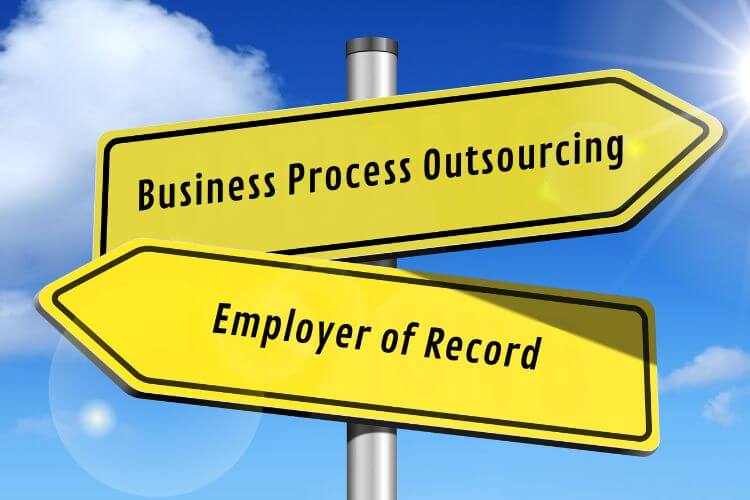For U.S. companies looking to expand their teams in the Philippines, selecting the right employment model is crucial. The decision can impact compliance, operational control, scalability, and overall operational success.
The most effective way businesses outsource is by partnering with agencies like Business Process Outsourcing (BPO) or Employer of Record (EOR) firms. Understanding the differences between these models will help you choose the solution that best supports your growth strategy.
An Employer of Record allows companies to hire employees legally in the Philippines without establishing a local entity. The EOR takes on employer responsibilities, such as compliance with local labor laws, while you manage the employees’ tasks and performance.
You can read more about EOR in our guide to Employer of Record services in the Philippines.
Business Process Outsourcing involves contracting an external service provider to handle specific business functions. Many companies use BPO in the Philippines for customer service, technical support, accounting, and back-office operations.
For more insights on this model, check out our overview of BPO trends in the Philippines.
Key Takeaways:
- EOR gives you control – You manage the team, select talent, and oversee daily operations, while the EOR handles compliance and HR administration.
- BPO manages entire functions – Ideal for outsourcing whole departments like customer service or IT, with less involvement in daily team management.
- EOR suits strategic or niche hiring – Best for companies wanting direct integration of offshore talent without setting up a local entity.
- BPO excels in scalability – Efficient for high-volume, process-driven tasks with predictable costs and quick ramp-up for large teams.
- Choose based on control vs. convenience – Use EOR for control and customization; choose BPO for speed, scale, and process delegation.
Key Differences Between EOR and BPO
Here’s a side-by-side comparison of the core aspects that distinguish EOR and BPO:
| Factors | Employer of Record | Business Process Outsourcing |
|---|---|---|
| Employment Relationship | The employee is officially hired by the EOR but works under your direction. | BPO hires and manages the staff who perform tasks for the business. |
| Talent Control | You choose and direct the employee’s work, training, and output. | The BPO provider assigns staff; limited input on individual team members. |
| Scope | Focused on individual employees or teams integrated into your business. | Typically covers entire functions or processes (e.g., customer support). |
| Customization | High-level roles, tools, and processes are tailored to your business needs. | Low to moderate standard processes with some ability to adapt workflows. |
| Flexibility | Scales with your business as you add employees or shift roles. | Scales easily for large teams or needs for 24/7 coverage. |
| Compliance Responsibility | EOR ensures adherence to Philippine labor laws and regulations. | BPO manages compliance for their employees, not the company’s obligations. |
BPO vs. EOR: Pros and Cons of Each Model
Business Process Outsourcing
BPO services in the Philippines manage both back-office functions, including IT services, accounting, HR, and payment processing, and front-office functions like sales, marketing, and customer or tech support.
The Philippines is an outsourcing hub, and BPOs allow companies to delegate entire processes or departments to external experts, enabling smoother operations without building local teams from scratch.
Pros:
- Predictable costs – BPO contracts come with clear, agreed-upon pricing that typically covers staff, office space, equipment, and infrastructure, helping you budget confidently.
- End-to-end process management – You get a fully managed team or department that handles operations for you, from staffing to daily oversight, so you can focus on strategic priorities.
- Time savings – With recruitment, training, and supervision handled by the BPO, you and your leadership team can redirect your time to core business initiatives.
- Scalability and flexibility – Whether you’re growing or need to adjust your team size, BPOs let you scale operations in or down quickly without the complications of internal restructuring.
- No need for local incorporation – BPO provides to take care of compliance, facilities, and HR requirements, so you don’t need to set up a legal entity to hire in the Philippines.
Cons:
- Less control over staff and culture – Since BPOs manage the team and internal processes, you can’t directly influence who they hire, how work is done, and how closely the team aligns with your company’s culture.
- Primarily for full teams or departments – Businesses typically design BPO for outsourcing larger functions rather than hiring a few specific individuals, which may not suit companies looking for specialized or niche roles.
- Limited company and product knowledge – BPO employees may not receive the same level of onboarding or product training as direct hires, leading to gaps in brand familiarity and expertise.
- Inconsistent quality – While BPOs can rapidly supply large teams, the focus on speed and volume can sometimes compromise service quality, specialized skills, or training depth, especially for more complex or high-touch tasks.

Employer of Record
An EOR is an outsourcing partner that takes care of the legal, HR, and administrative tasks involved in hiring remote employees. It offers businesses a fast, compliant way to employ talent abroad, without the hassle of setting up a local entity or risking labor law violations.
In short, an EOR handles contracts, payroll, and regulatory requirements, while you focus on managing your team and driving results. This model is suitable for HR outsourcing services in the Philippines.
Pros
- Full control over your team – You decide who gets hired, promoted, or let go. You manage day-to-day work, projects, and schedules, ensuring alignment with your business goals.
- Flexible for any team size – Whether you need one specialist or a small team, EORs adapt to your requirements without a minimum headcount.
- Saves time – Free yourself from admin tasks and focus on growing your business while the EOR handles HR, payroll, and compliance.
- No local entity needed – Skip the complexity of setting up a company overseas. The EOR ensures you’re fully compliant with local labor laws.
- Collaborative hiring – The EOR sources candidates and handles initial screening, but you make the final call, so you’re confident in your team’s quality and fit.
- Transparent costs – You set the salaries, and both parties agree on the pricing upfront—so there are no hidden fees or surprises.
- Quality assurance – You control onboarding, training, and performance standards to ensure services meet your expectations.
Cons
- You manage the team – While the EOR handles the legal side, daily management, training, and performance oversight are up to you.
- Not for bulk, fast hires – EORs focus on quality over quantity. Finding the right candidates may take longer, as they emphasize fit, background checks, and compliance, often a few days to several weeks, depending on the role.
Which One Is Right for U.S. Companies Hiring in the Philippines?
Both EOR and BPO models are legal, proven solutions that help U.S. companies access top Philippine talent without the complexity of setting up a local entity. The right choice depends on your business goals:
Choose EOR if:
You want direct control over your employees, need to ensure strong alignment with your company culture, or are hiring for strategic or specialized roles. EOR is ideal for companies wanting to build dedicated offshore teams integrated into their operations. This model is also a great opportunity for small BPO companies in the Philippines, with their outsourcing and then scaling up.
Choose BPO if:
You need scalable, cost-effective teams for high-volume, process-driven, or repetitive work. BPO is the go-to model for companies looking for ready-made infrastructure, large teams, or 24/7 support without managing day-to-day operations.
The key takeaway: Both models can drive success, but they serve distinct business needs. A thoughtful assessment of your priorities, including control, cost, scalability, and customization, will guide you to the right fit.
Philippine Outsourcing With CreaThink Solutions
BPO in the Philippines remains a global powerhouse, creating millions of jobs and drawing steady international investment. In 2025 and beyond, the country’s outsourcing sector will continue to evolve, embracing new technologies and trends to deliver dependable, high-quality solutions that businesses worldwide trust.
At CreaThink Solutions, we stay ahead of the curve by blending innovation with expertise. Our team of dedicated Filipino BPO professionals delivers customized BPO and EOR services that go beyond traditional customer support. As a trusted name in Philippines outsourcing, we design solutions tailored to fit your business, fuel your growth, and help you achieve your goals.
Ready to level up your business? Let’s talk about how CreaThink Solutions can help your business thrive.
Check out our EOR and BPO services in the Philippines. Connect with us on Facebook, LinkedIn, and YouTube to learn more!









